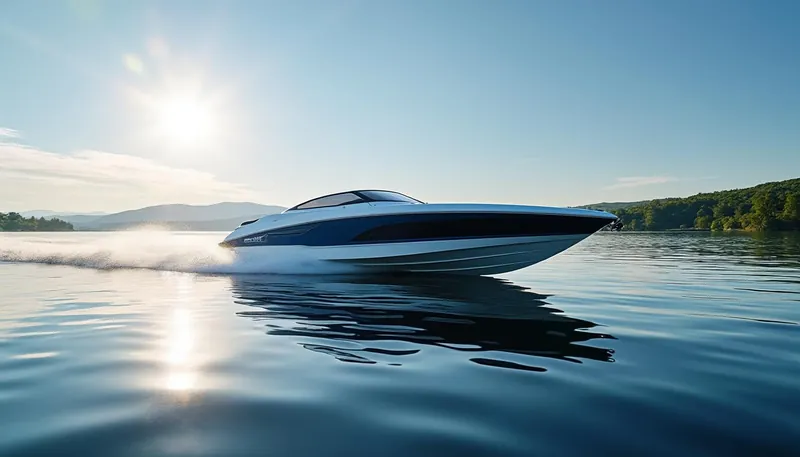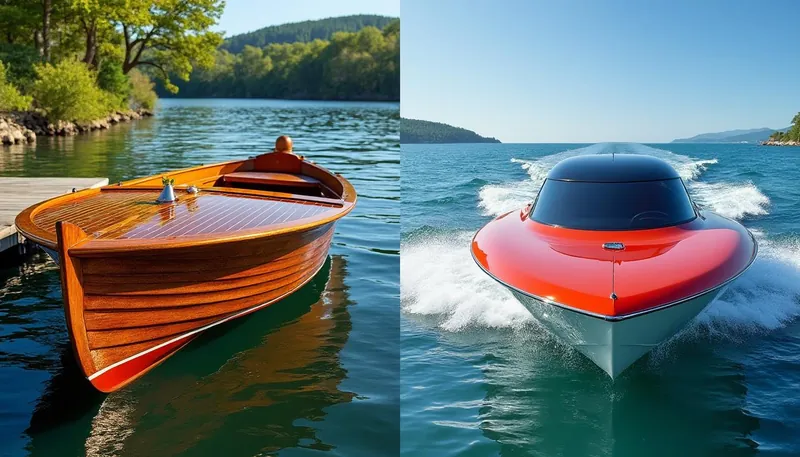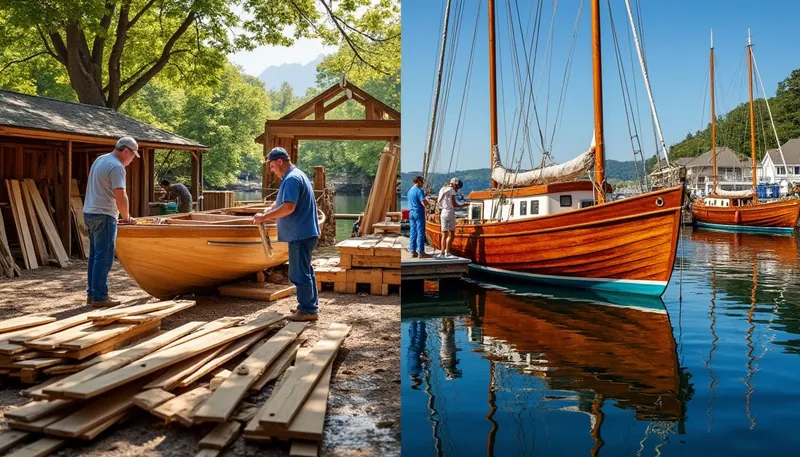As boating enthusiasts continue to seek the perfect vessel, the timeless debate between wooden and fiberglass boats persists. Whether you’re a seasoned sailor or a curious newcomer, understanding the distinctive qualities of these two materials will significantly influence your choice. Both materials offer unique benefits and challenges that can impact your sailing experience, maintenance, and overall satisfaction. With a growing number of boat manufacturers and designs capturing attention, including renowned names like Chris-Craft, Hinckley, and Riva, the decision-making process becomes crucial. This article will dissect the pros and cons of each material, guiding you toward making a well-informed decision that fits your style and boating aspirations.
Brief
- 🌳 Wooden Boats: Classic and Durable – Renowned for their elegance and customization, wooden boats can last generations with proper care.
- ⚓ Fiberglass Boats: Affordable and Low Maintenance – These modern vessels offer durability and ease of upkeep, appealing to budget-conscious boaters.
- 💰 Cost Considerations – Wooden boats require more upfront investment and ongoing maintenance, while fiberglass boats are generally cheaper.
- 🔧 Customization and Repair – Wooden boats are more customizable compared to fiberglass options, which can be difficult to modify after construction.
- 🚤 Resale Value – Wooden boats maintain a higher resale value compared to their fiberglass counterparts, making them a better investment for dedicated enthusiasts.
Advantages of Wooden Boats
Wooden boats have captured the imaginations of sailors for centuries, and it’s no surprise why. They offer significant advantages that continue to appeal to boat aficionados today.
Outstanding Toughness
Despite being constructed from natural materials, wooden boats demonstrate remarkable resilience. With proper maintenance, they can weather the storms of time and saltwater, proving their worth against wear and tear. For instance, some wooden boats have been reported to last over 70 years, showcasing the *outstanding toughness* that a well-cared-for vessel can achieve. The choice of wood, such as mahogany or teak, significantly influences this durability, providing strength and aesthetic appeal.
Classic and Elegant Appearance
There’s an undeniable allure to the classic design of wooden boats. Their elegant silhouette and natural grains serve not only to please the eye but also imbue each vessel with its own personality. Boating brands like Gar Wood and StanCraft have built legacies on the back of their beautifully crafted wooden designs, proving that tradition remains coveted even in a world dominated by modern materials.
Flexibility and Customization
If customization is your priority, wooden boats are the way to go. Unlike fiberglass boats, wood can be easily shaped and modified to suit your needs. You can alter the deck design, change the type of keel, or adjust the internal layout without the technical hurdles present in fiberglass construction. For example, a friend of mine (let’s call him Mike) recently transformed his old wooden sailboat from a standard cruiser into a bespoke fishing boat. With a little effort, he was able to adapt the features, making it truly his own.
Resale Value
A study of the boating market indicates that wooden boats generally retain their value better than their fiberglass counterparts. They are often regarded as collector items and maintain a higher status among boating enthusiasts, which plays a crucial role in their resale viability. This factor should not be underestimated for anyone contemplating the long-term investment of a boat.
| Advantage | Description |
|---|---|
| 🌳 Outstanding Toughness | Resilient; can last many decades with proper care. |
| ⚓ Classic Appearance | Elegant aesthetics; each boat has unique character. |
| 🔧 Customization | Easy to modify; adapt designs according to needs. |
| 💰 Higher Resale Value | Retain value better than fiberglass boats; more attractive to buyers. |

Disadvantages of Wooden Boats
While wooden boats boast several compelling advantages, they also come with a set of challenges and drawbacks that aspiring boat owners should consider.
High Maintenance Costs
The upkeep of wooden boats can be quite demanding. Regular maintenance, such as cleaning, waterproofing, and occasional varnishing, is essential to prevent issues like rot or deterioration. Failure to maintain your vessel can lead to hefty repair costs down the line. If you aren’t prepared to allocate regular time and resources to your boat’s upkeep, a wooden option might not be the best fit for you.
Heavier Hulls
Generally, the hulls of wooden boats are heavier than those of fiberglass boats, which can affect efficiency and maneuverability. Particularly in challenging waters with strong currents or high winds, wooden boats may be harder to handle. Newer boaters might find themselves overwhelmed when attempting to steer a heavy wooden vessel. This is a crucial consideration, especially for those still honing their boating skills.
Cost of Purchase
When you factor in the costs associated with building and maintaining a wooden boat, it becomes evident that they can be relatively expensive compared to fiberglass alternatives. The construction process requires skilled artisans, high-quality materials, and considerable time. Thus, the initial investment, when added to ongoing expenses, can be off-putting for budget-conscious buyers.
| Disadvantage | Description |
|---|---|
| 💸 High Maintenance | Regular upkeep is essential; can be time-consuming and costly. |
| ⚠️ Heavier Hulls | Can affect maneuverability; more challenging in difficult conditions. |
| 💰 High Purchase Costs | Initial investment and maintenance are often more expensive. |
Advantages of Fiberglass Boats
Fiberglass boats have gained significant popularity for their affordability and specific characteristics that cater to many modern boaters.
Affordable Price
One of the most convincing arguments for choosing a fiberglass boat is the overall cost. The materials are more economical, and the manufacturing process is streamlined for efficiency. Brands like Boston Whaler or Bertram offer quality fiberglass options that won’t break the bank, catering to both newcomers and seasoned sailors on a budget.
Long Service Life
With superior resistance to corrosion and UV damage, fiberglass boats are exceptionally durable. Properly maintained, they can provide reliable service for years, making them an enticing option for those seeking longevity without intensive maintenance. Thanks to the robust structure of fiberglass, you can expect fewer issues around deterioration or structural problems.
Simple Maintenance
Unlike wooden boats that demand constant attention, fiberglass boats are much simpler to maintain. Routine tasks include basic cleaning and occasional wax applications—no need for extensive varnishing or waterproofing. This ease of maintenance can be appealing to busy boaters who want to spend more time on the water rather than on the dock!
| Advantage | Description |
|---|---|
| 💵 Affordable Price | Cost-effective; manufacturing is streamlined and efficient. |
| ⏳ Long Service Life | Durable construction; resistant to corrosion and UV damage. |
| 🧼 Simple Maintenance | Low upkeep; usually requires only minimal cleaning. |

Disadvantages of Fiberglass Boats
While fiberglass boats offer many practical advantages, they also come with their own set of downsides that boaters should recognize before making a purchase.
Lack of Uniqueness
Fiberglass boats sometimes fall short in terms of personality. As they are made from synthetic materials, they often lack the unique character that wooden boats naturally possess. As a result, many sailing enthusiasts may find fiberglass boats less appealing due to their standard appearance and design.
Difficulty in Customization
Another downside is the limited ability to customize fiberglass boats after construction. Once a fiberglass boat is molded, making changes can prove challenging. This contrasts starkly with wooden boats, where you can easily modify the design to meet your preferences. Those who are looking for a personal touch may feel confined by fiberglass options.
Limited Resale Value
When it comes to the resale market, fiberglass boats typically suffer from lower prices relative to wooden boats. Higher availability and reduced demand often lead to less attractive resale opportunities. If maximizing your investment is a priority, this is an essential consideration.
| Disadvantage | Description |
|---|---|
| ⚠️ Lack of Uniqueness | Sterile appearance; lacks character compared to wooden options. |
| 🔒 Difficulty in Customization | Modifications can be challenging; limited options for personalization. |
| 📉 Limited Resale Value | Lower second-hand market prices; less attractive to future buyers. |
FAQ
What type of boat is better for a beginner?
Fiberglass boats are generally more forgiving and easier to handle for beginners due to their lightweight and efficient maneuverability.
Do wooden boats require more maintenance than fiberglass?
Yes, wooden boats require regular maintenance, including cleaning and waterproofing, while fiberglass boats have lower upkeep needs.
Are wooden boats more expensive than fiberglass boats?
In general, yes. Wooden boats often have higher initial costs and more significant ongoing maintenance expenses.
How does the resale value differ between wooden and fiberglass boats?
Wooden boats typically hold their value better than fiberglass options, making them more attractive investments.
Can fiberglass boats be customized?
Fiberglass boats are harder to customize post-production, unlike wooden boats which offer greater flexibility.


